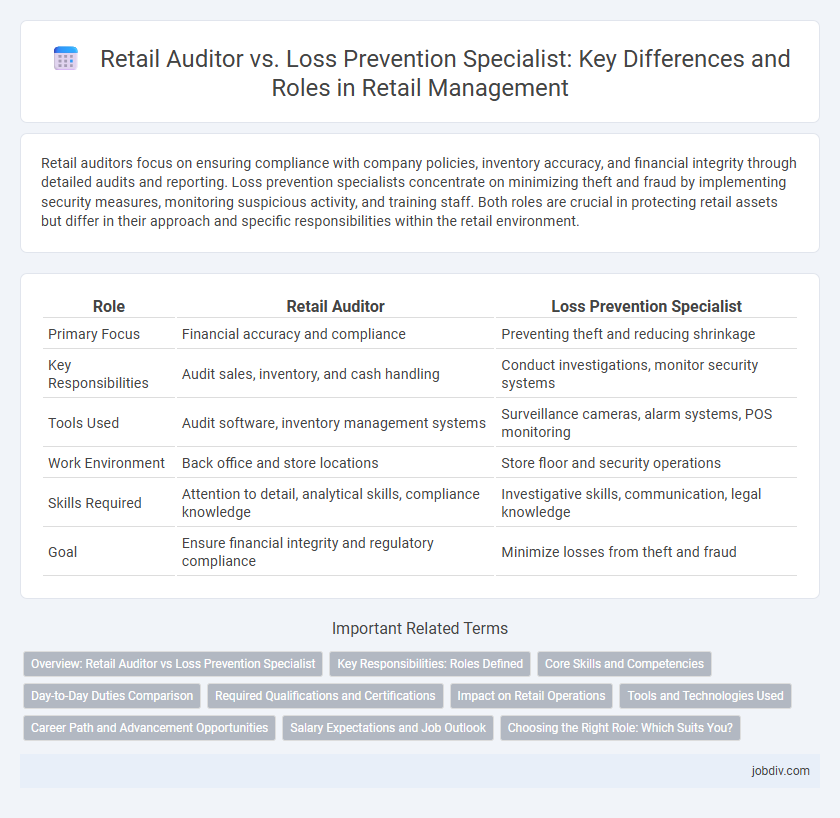Retail auditors focus on ensuring compliance with company policies, inventory accuracy, and financial integrity through detailed audits and reporting. Loss prevention specialists concentrate on minimizing theft and fraud by implementing security measures, monitoring suspicious activity, and training staff. Both roles are crucial in protecting retail assets but differ in their approach and specific responsibilities within the retail environment.
Table of Comparison
| Role | Retail Auditor | Loss Prevention Specialist |
|---|---|---|
| Primary Focus | Financial accuracy and compliance | Preventing theft and reducing shrinkage |
| Key Responsibilities | Audit sales, inventory, and cash handling | Conduct investigations, monitor security systems |
| Tools Used | Audit software, inventory management systems | Surveillance cameras, alarm systems, POS monitoring |
| Work Environment | Back office and store locations | Store floor and security operations |
| Skills Required | Attention to detail, analytical skills, compliance knowledge | Investigative skills, communication, legal knowledge |
| Goal | Ensure financial integrity and regulatory compliance | Minimize losses from theft and fraud |
Overview: Retail Auditor vs Loss Prevention Specialist
A Retail Auditor conducts comprehensive financial and operational audits to ensure compliance with company policies and identify discrepancies in inventory and sales data, using analytical tools to improve accuracy. A Loss Prevention Specialist focuses on preventing theft, fraud, and inventory shrinkage by implementing security measures, monitoring surveillance systems, and training staff on loss prevention strategies. Both roles are essential for maintaining profitability, but the Retail Auditor emphasizes financial integrity while the Loss Prevention Specialist concentrates on security and risk management.
Key Responsibilities: Roles Defined
Retail Auditors focus on examining financial records, ensuring compliance with company policies, and identifying discrepancies through inventory audits and transaction reviews. Loss Prevention Specialists specialize in preventing theft, monitoring security systems, and investigating suspicious activities to reduce shrinkage and protect assets. Both roles collaborate closely to enhance operational efficiency and safeguard retail profitability.
Core Skills and Competencies
Retail Auditors excel in financial analysis, inventory management, and compliance auditing, ensuring accurate record-keeping and detecting discrepancies through data-driven investigations. Loss Prevention Specialists possess strong observational skills, risk assessment abilities, and expertise in security technology to prevent theft, employee fraud, and enhance store safety. Both roles require attention to detail, problem-solving skills, and knowledge of retail operations, but auditors focus more on financial accuracy while loss prevention specialists emphasize security protocols.
Day-to-Day Duties Comparison
Retail Auditors conduct comprehensive inspections of inventory accuracy and sales records to ensure financial compliance and identify discrepancies. Loss Prevention Specialists focus on monitoring store activities through surveillance systems, conducting investigations into theft incidents, and implementing security measures to minimize shrinkage. Both roles require collaboration with store management to improve operational efficiency and reduce financial losses.
Required Qualifications and Certifications
Retail auditors typically require strong analytical skills, proficiency in financial reporting, and certifications such as Certified Internal Auditor (CIA) or Certified Fraud Examiner (CFE). Loss prevention specialists need expertise in surveillance techniques, risk assessment, and often hold certifications like Certified Protection Professional (CPP) or Loss Prevention Certified (LPC). Both roles benefit from experience in retail operations and a thorough understanding of compliance and regulatory standards.
Impact on Retail Operations
Retail Auditors enhance retail operations by conducting comprehensive inspections and ensuring compliance with financial and operational standards, which minimizes discrepancies and improves overall efficiency. Loss Prevention Specialists focus on reducing shrinkage through surveillance, employee training, and security protocols, directly impacting inventory accuracy and profit margins. Both roles are integral to safeguarding assets and optimizing the retail supply chain, but Retail Auditors emphasize financial integrity while Loss Prevention Specialists concentrate on theft deterrence and loss minimization.
Tools and Technologies Used
Retail Auditors primarily use data analytics software, inventory management systems, and audit tracking tools to ensure compliance and accuracy in financial reporting. Loss Prevention Specialists rely on surveillance cameras, electronic article surveillance (EAS) systems, point-of-sale (POS) monitoring, and incident reporting software to detect and prevent theft. Both roles utilize mobile devices and real-time communication platforms to enhance operational efficiency and response times.
Career Path and Advancement Opportunities
Retail Auditors typically advance by gaining expertise in compliance, financial analysis, and operational efficiency, often moving into senior audit roles or corporate risk management. Loss Prevention Specialists progress through developing skills in security technology, investigative techniques, and team leadership, leading to positions such as loss prevention manager or director of security. Both career paths offer opportunities for advancement within retail organizations, with Retail Auditors focusing on financial integrity and Loss Prevention Specialists emphasizing asset protection and risk mitigation.
Salary Expectations and Job Outlook
Retail Auditors typically earn an average salary ranging from $45,000 to $65,000 annually, while Loss Prevention Specialists have a salary expectancy between $40,000 and $60,000 depending on experience and location. The job outlook for Retail Auditors is projected to grow moderately due to increasing demand for financial accuracy and compliance, whereas Loss Prevention Specialists face steady growth driven by heightened retail theft prevention efforts. Both roles offer career stability with opportunities for advancement in retail management and security sectors.
Choosing the Right Role: Which Suits You?
Retail Auditors focus on verifying financial accuracy and operational compliance through detailed store inspections and inventory audits, ensuring loss prevention from a data-driven perspective. Loss Prevention Specialists emphasize real-time theft deterrence and security measures, utilizing surveillance and employee training to minimize shrinkage. Selecting the right role depends on whether you prefer analytical, compliance-based responsibilities or proactive, hands-on security and risk management within retail environments.
Retail Auditor vs Loss Prevention Specialist Infographic

 jobdiv.com
jobdiv.com